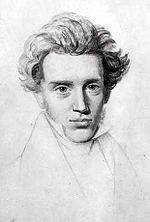- Double-mindedness
-
Double-mindedness is a concept used in the philosophy and theology of the Danish philosopher Søren Kierkegaard.
Elaborating the concept in several of his edifying discourses, Kierkegaard asserts that double-mindedness is a moral category that comes about by a failure of willing authentically.[1] He contrasts double-mindedness with "Purity of Heart", which is, a state of being which wills authentically. Double-mindedness fails to will the Good for its own sake, but instead wills the Good on extramoral grounds, such as insincerity, egoistic, or fear of punishment:
- In order, genuinely to will one thing, a man must in truth will the Good. On the other hand, as for each act of willing the Good which does not will it in truth, it must be declared to be double-mindedness. Then there was a type of double-mindedness that in a more powerful and active sort of inner coherence seemed to will the Good, but deceptively willed something else. It willed the Good for the sake of reward, out of fear of punishment, or as a form of self-assertion. But there was another kind of double-mindedness born of weakness, that is commonest of all among men, that versatile double-mindedness that wills the Good in a kind of sincerity, but only wills it "to a certain degree." - Purity of Heart, Chapter 8
The first type of double-mindedness, that of willing for the sake of reward or out of fear of punishment, is akin to the distinction between intrinsic and extrinsic values. The second type of double-mindedness, that of willing only to a certain degree, is akin to distraction or half-hearted willing. Each type of double-mindedness is a human weakness and an obstacle to an individual pursuit of greatness and strength towards willing and reaching the Good.[2] To counter double-mindedness, Kierkegaard argues that discipline and clarity of the self is essential and necessary to overcome double-mindedness.
Primary Sources
Purity of Heart Is to Will One Thing, by Sören Kierkegaard, March 13, 1847
References
Søren Kierkegaard 1843–1846 On the Concept of Irony with Continual Reference to Socrates · Either/Or · Two Upbuilding Discourses, 1843 · Repetition · Three Upbuilding Discourses · Fear and Trembling · Four Upbuilding Discourses, 1843 · Two Upbuilding Discourses, 1844 · Three Upbuilding Discourses, 1844 · Philosophical Fragments · The Concept of Anxiety · Prefaces · Four Upbuilding Discourses, 1844 · Three Discourses on Imagined Occasions · Stages on Life's Way · Concluding Unscientific Postscript to Philosophical Fragments · Two Ages: A Literary Review

1847–1854 Edifying Discourses in Diverse Spirits · Works of Love · Christian Discourses · The Crisis and a Crisis in the Life of an Actress · The Lily of the Field and the Bird of the Air · The Sickness Unto Death · Three Discourses at the Communion on Fridays · Practice in Christianity · Two Discourses at the Communion on Fridays · The Book on Adler · For Self-Examination · Attack Upon Christendom
Posthumous publications Ideas Philosophy · Theology · Angst · Anguish · Authenticity · Double-mindedness · Indirect communication · Infinite qualitative distinction · Knight of faith · Leap of faith · Ressentiment · Rotation method
Related topics
Wikimedia Foundation. 2010.
